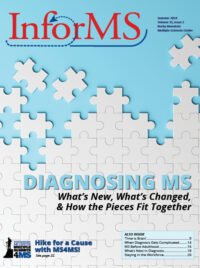
Dr. Teri Schreiner’s work in MS is focused on the rarest of patients: children. The vast majority of newly-diagnosed patients are roughly between the ages of 25 and 45, but MS can and does appear at a much younger age. We talked with Dr. Schreiner about the differences in diagnosing those under the age of 18.
InforMS: We wanted your unique perspective on diagnosing the pediatric population — recognizing that MS is likely the same disease process in children and adults, but there are some distinctions.
Dr. Schreiner: There are many similarities between how kids and adults come to a diagnosis of MS. What makes diagnosing a child with MS challenging is that it’s such a rare condition in childhood. So when a child presents with a focal neurologic finding, there are other things that are thought of more readily because they are more common in childhood than in adults. Oftentimes MS is only the third, fourth or fifth consideration of what might be causing that child’s neurologic deficit.
Historically, I think that has been even a greater obstacle to overcome because pediatric MS wasn’t recognized as readily. Now we are recognizing it more, but it’s still so uncommon that it’s not at the top of anybody’s mind when evaluating a child with a neurologic deficit.
And the presentation of kids can be much different, particularly in pre-pubertal kids.. Kids can present with encephalopathy, which is really being somnolent or sleeping 20 hours a day, all the way to frankly seeing and hearing things that aren’t there and being markedly off their mental baseline. That is something we don’t see in adults.
As kids get older, their presentation begins to look more and more like what we commonly see in adults. For example, teenagers can get optic neuritis, which is a common first presenting symptom of MS in adults. They can present with a focal weakness, focal sensory change and have an MRI that looks a lot more like an adult with MS than that of a pre-pubertal child with MS. Thus, how we approach a child with a neurologic deficit who might have MS is much different depending on the age of the child.
Up until the second to most recent iteration of the MacDonald diagnostic criteria, we used different criteria to diagnose kids with MS. Those criteria pretty much meant that a child would have to experience two neurologic events before they could be diagnosed with MS. Now the diagnostic criteria for kids are more sophisticated.
InforMS: The changes in the MacDonald criteria has most likely made diagnosing post-pubescent children easier, more straight forward. Have you seen a shift in ability to get kids on effective treatment because of that?
Dr. Schreiner: Absolutely. The ability to diagnose a child with MS accurately and early means that they don’t have to suffer another relapse before they can get to a diagnosis and start the right therapy. So early accurate diagnosis really does improve outcomes for kids. One of the best reasons to diagnose early is to get them on effective treatment to prevent further relapses.
InforMS: What are some of the other things that are commonly misdiagnosed for children who actually have MS?
Dr. Schreiner: One of the most common misdiagnoses of MS, particularly in young children, is called acute disseminated encephalomyelitis (ADEM). This is a post infectious, one-time disorder. It occurs in susceptible kids after some trigger, which might be just a common virus. So this is not an unreasonable thing, when someone presents with a neurologic deficit and they have a brain MRI that looks like demyelination, we say, ‘Well this must be ADEM and it’s a one-time occurrence so no further treatment is necessary.’ When in fact, if it’s MS mistaken for ADEM, you are missing an opportunity to intervene in the interval between that first exacerbation and subsequent ones.
InforMS: in your experience, do you find it’s less common for a child’s pediatrician to refer them to a neurologist based on their early symptoms? Does it take longer for the pediatric population to get to you?
Dr. Schreiner: It can take longer for pediatric patient to find their way to me, particularly if the symptoms are mild. For example, if there is a mild weakness, worsened fatigue, or a visual deficit that is not limiting the child’s schoolwork, a pediatrician may not have a high degree of suspicion for MS. When there’s an acute presentation, the kids usually present to an Emergency Department and can find their way more quickly to me.
Access is also an issue. Colorado is a large state with many rural communities and the access to care in general, especially for pediatric neurology is going to be limited in those areas.
InforMS: It’s rare to be a specialist in pediatric MS. Can you talk about that a little bit?
Dr. Schreiner: That’s true. There are not many neurologists who specialize in pediatric MS and neuro-immunology. Within the US, there is a network of pediatric MS centers supported by the National MS Society, and there are 15 of us that contribute data to try to better understand both the diagnosis and treatment of MS in kids. The number of pediatric neurologists treating patients with pediatric MS is greater than 15, but still a small number on a national scale.
InforMS: How old is the youngest patient you have diagnosed to date?
Dr. Schreiner: Seven years old… It’s really quite unusual; less than one percent of all MS diagnoses occur in that pre-pubertal range. In total, children with pediatric MS are thought to account for five percent of all patients with MS.
InforMS: What are the key messages that you want a child and their family to hear upon diagnosis? Recognizing every case is different, what do you want them walking away understanding in a fundamental way?
Dr. Schreiner: I want them to understand that the disease is serious enough that it requires treatment, but that we do have treatments, and life will go on, and this disease shouldn’t alter the trajectory of that child’s life. I feel pretty strongly about that because there’s a risk of a child getting a chronic disease and choosing a different life path because of some misconception or misunderstanding of what the disease will mean for them in the future, and thus not realizing their full potential. That would be tragic. I try to walk that fine line between emphasizing that you have to attend to this disease; you need to take your medicine, you need to come to your doctor visits, you need to get MRIs. But concurrent to that, life goes on. We have reason to be optimistic because our therapies are getting better and better and we want this young person to grow up, to be who they want to be regardless of having this diagnosis.
In addition to being an RMMSC neurologist, Dr. Schreiner leads the Pediatric MS Multidisciplinary Clinic at Children’s Hospital Colorado. The clinic provides MS-specialty care for those under the age of 18, including psychology, neuropsychology, social work and patient education. For more information call (720) 777-2212 or email msclinic@childrendscolorado.org.



